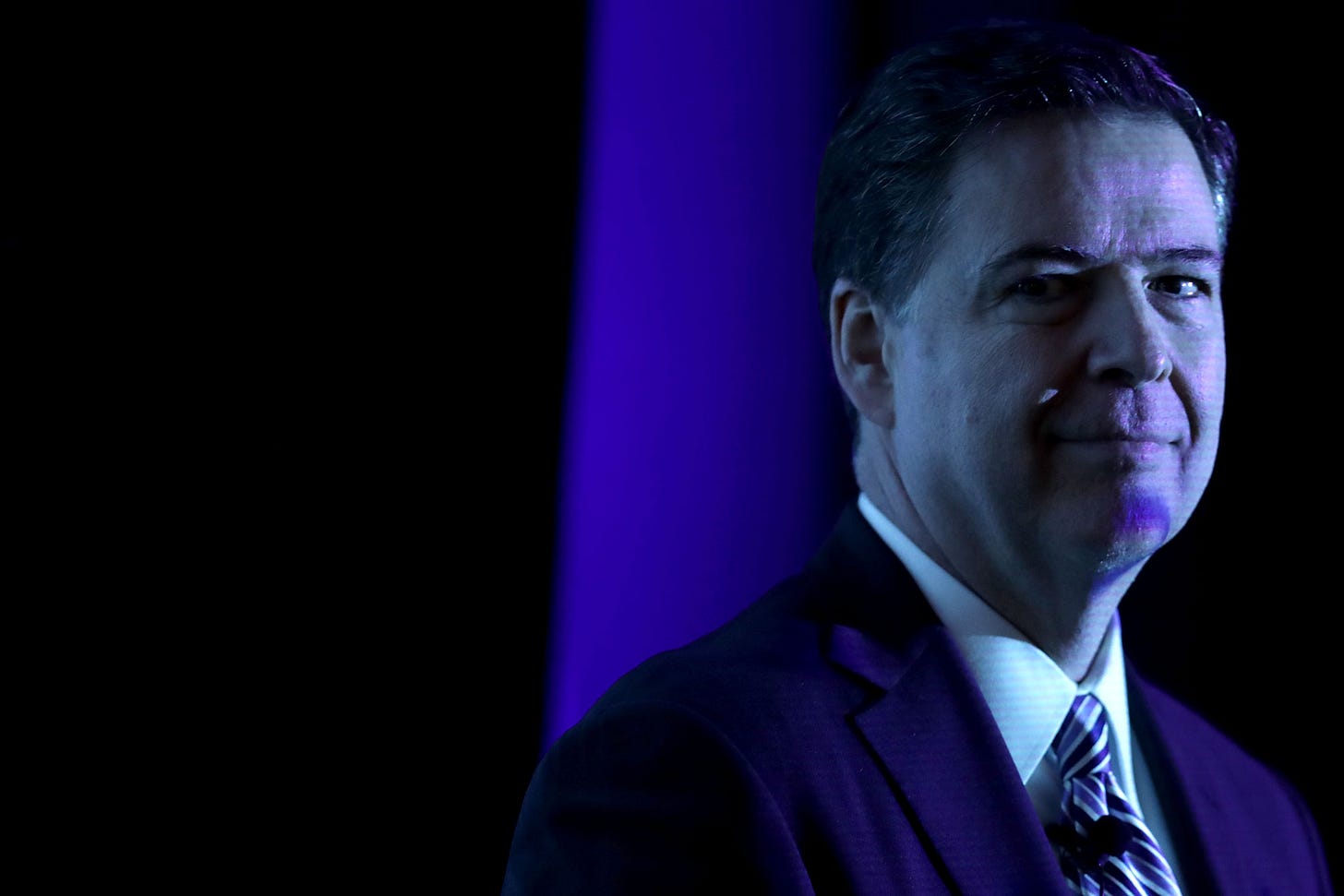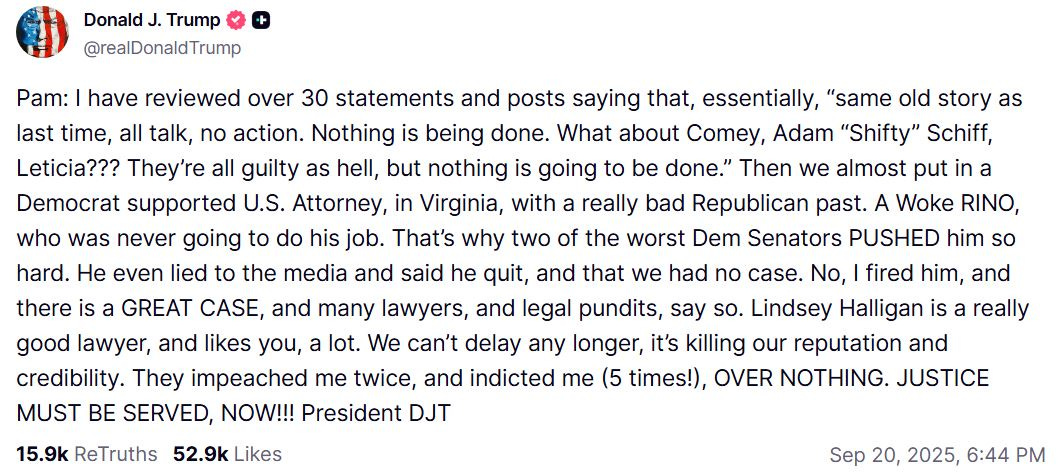THE SHAM INDICTMENT of former FBI director James Comey should be dismissed for many reasons, but the simplest is that it’s vindictive. As a basis for dismissal, this argument—which could take the form of a pretrial motion claiming vindictive prosecution—requires the defense to show two things: first, that the prosecution was based on animus; and second, that without the animus, it wouldn’t have been pursued.
Donald Trump’s conduct leading up to the indictment offers conclusive evidence on the first point and strong evidence on the second. Here’s what the record shows.
Comey posted a picture of shells that had been arranged on a beach to say “8647.” When Trump supporters interpreted the “86” as a call for violence, Comey explained, “I didn’t realize some folks associate those numbers with violence. It never occurred to me but I oppose violence of any kind so I took the post down.” (The “47” referred to Trump, the 47th president. Meanwhile, “86” has traditionally meant to abandon or give up on something; it originated in slang used long ago by restaurant staff.)
The next day, in an interview with Trump, Bret Baier noted that Comey “said he wasn’t calling for violence.” But Trump rejected that explanation. “He knew exactly what that meant,” said Trump. “He’s calling for the assassination of the president.”
This was the first of several allegations by Trump, in his second term, that Comey had committed crimes.
A reporter asked Trump: “James Comey and John Brennan [are] now under criminal investigation related to the Trump-Russia probe. Do you want to see these two guys behind bars?” Trump replied, “I think they’re crooked as hell, and maybe they have to pay a price for that.”
“Pay a price,” in this context, clearly meant criminal penalties.
According to the New York Times, “Trump’s campaign of retribution began to intensify in mid-July,” with “growing frustration over the pace of Justice Department inquiries into all of his enemies, including Mr. Comey.”
Reporters quizzed Trump about his administration’s investigation of former officials involved in the Russia probe. One reporter asked: “Tulsi Gabbard has submitted a criminal referral to the Department of Justice. From your perspective, who should the DOJ target as part of their investigation?” In response, Trump named Comey, Barack Obama, Joe Biden, and James Clapper, the former director of national intelligence. “They tried to rig an election,” said Trump, adding that “the old FBI under Comey was crooked as hell. He was one of the most crooked.”
Trump didn’t specify a crime in this exchange, but “rig an election” clearly implied criminal acts.
Responding to a question about Gabbard’s investigation, Trump made a startling claim: “It’s incredible what we’re finding: absolute proof of guilt.” He went on: “Clapper and Comey and that whole group of criminals. . . . They’re sick people, and they’re criminals, and they should be taken care of.”
“Absolute proof of guilt” was unmistakably a criminal allegation. “Taken care of,” like “pay a price,” was a call for retribution. And “sick,” which Trump applied to Comey throughout this period, conveyed the president’s personal loathing.
An interviewer for the Daily Caller asked Trump about Gabbard’s investigation: “Do you think there are going to be arrests?” Trump replied, “There should be. What they did is a disgrace. They cheated, they lied. . . . They committed all the crimes.”
Trump indicated that he could intervene personally to bring the villains to justice: “I’m allowed to stay involved, but I purposely don’t get involved. I can say that they should be arrested.”
The reporter followed up: “So James Comey and John Brennan, would you be comfortable seeing them handcuffed and arrested live on TV?” Trump replied, “Would not bother me at all.”
This was Trump’s clearest statement yet that Comey should be charged with crimes.
According to the Times, prosecutors’ efforts to gather sufficient evidence against Comey weren’t panning out, and Erik Siebert, the U.S. attorney overseeing the investigation, “began expressing serious doubts about the case, which quickly made their way up the chain of command. By mid-September, Mr. Trump was determined to rid himself of Mr. Siebert.”
A reporter noted that Siebert hadn’t prosecuted New York Attorney General Letitia James—another target of Trump’s ire—and asked Trump whether he wanted Siebert to be fired. Trump said yes. He claimed he had reached this conclusion “when I saw that he [Siebert] got approved” by “two Democrat senators in Virginia.” That was a lie: The two senators had recommended Siebert in a letter to Trump before Trump nominated him.
According to the Times, Trump’s personnel director, Sergio Gor, “moved to dismiss Mr. Siebert after Mr. Trump said multiple times that he wanted him fired.”
Hours after Trump called for Siebert’s ouster, Siebert resigned.
On Truth Social, Trump posted a message to Attorney General Pam Bondi:
Short of explicitly writing out the words “Indict Comey,” it’s hard to imagine a clearer command to indict Comey. And in case Trump’s animus wasn’t sufficiently clear, his stated rationale—“they impeached me twice, and indicted me”—left no doubt.
For good measure, Trump stamped his fingerprints on Siebert’s ouster. In the Truth Social post, he rejected the prosecutor’s claim of resignation. “No, I fired him,” Trump boasted.
Three hours after that post, Trump announced that he was appointing Lindsey Halligan, his former personal lawyer, to replace Siebert. According to the Times, Bondi and Todd Blanche, the deputy attorney general, “had not been given much of a head’s up” about her selection, and “both quietly questioned Ms. Halligan’s credentials.” The fact that Trump issued the announcement through his Truth Social account underscored that this was his call and that Halligan was his agent.
Trump repeated that he was entitled to intervene personally in the legal process against Comey. “I think I’d be allowed to get involved if I want,” he said, “but I don’t really choose to do so. I can only say that Comey is a bad person. He’s a sick person.”
Hours later, Halligan secured the indictment.
EVEN WITHOUT FURTHER INVESTIGATION, the timeline shows that Trump was driven by animus against Comey and that Trump’s animus forced the indictment. All the prosecutors who didn’t share Trump’s animus—not just Siebert, but those who worked for him—agreed that the evidence was insufficient to proceed. Trump accused Comey of multiple crimes, said he should be arrested and punished, ousted a prosecutor who refused to indict Comey, instructed the attorney general to prove Comey’s guilt, and installed his former personal attorney to get the job done.
The evidence against Comey is embarrassingly weak. If this case goes to trial, he should win acquittal easily. But it shouldn’t get that far, because the evidence against Trump—the evidence of vindictive prosecution—is overwhelming.


